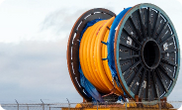Descubriendo los beneficios del cumplimiento de la norma ISO: Cómo lograr la excelencia organizacional
La industria de cables y alambres presenta desafíos únicos. En medio de las complejidades del sector, lograr la excelencia organizacional no es tarea fácil. Desde la gestión de la calidad del producto hasta la gestión de amenazas y la ciberseguridad moderna, es un proceso complejo que puede resultar abrumador. Una solución clave para optimizar estos procesos es el cumplimiento de las normas ISO. Exploremos cómo el cumplimiento de las normas ISO puede guiar a una empresa de cables y alambres hacia su máximo rendimiento.

Descifrando la conformidad con la norma ISO
En el ámbito de la ISO, "cumplimiento" significa seguir las directrices de las normas establecidas por la Organización Internacional de Normalización (ISO). Estas directrices difieren según la industria y están diseñadas para garantizar la calidad, la seguridad y la eficiencia. En la industria de cables y alambres, dos normas clave prevalecen: la ISO 9001 para la gestión de la calidad y la ISO 27001 para la gestión de la seguridad de la información.
Vamos a desglosarlos:
ISO 9001: Gestión de la Calidad
La ISO 9001 es, en esencia, una hoja de ruta para garantizar la calidad de sus productos o servicios. Para una empresa de cables y alambres, es su guía para mantener el estándar en todo, desde las materias primas hasta el producto terminado.
Esta norma no se trata de alcanzar un objetivo puntual, sino de construir una cultura de mejora continua y satisfacción del cliente. Le ayuda a supervisar de cerca sus operaciones, identificar áreas de mejora y tomar medidas correctivas cuando sea necesario.
ISO 9001 es su receta secreta para producir cables y alambres de máxima calidad de manera constante, mejorando así la satisfacción del cliente y la reputación de su marca.
ISO 27001: El defensor de los datos
La importancia de la privacidad y la seguridad de los datos en nuestra era digital es indiscutible. Como empresa de cables y alambres, gestiona datos importantes, desde información de proveedores y clientes hasta datos de producción interna. La norma ISO 27001 proporciona un marco sólido para la gestión segura de estos datos.
Le ayuda a identificar posibles riesgos para su información e implementa controles para gestionarlos o reducirlos. De hecho, garantiza que sus valiosos datos, y los de sus clientes, estén bien protegidos contra las amenazas modernas de ciberseguridad.
Una lista de verificación de cumplimiento ISO puede proporcionar una hoja de ruta más detallada para cumplir con estas normas. Al comprender e implementar estas directrices ISO, su empresa de cables y alambres puede mejorar su excelencia operativa y su ventaja competitiva.
¿Qué beneficios tiene esto para la industria de alambres y cables?
Cumplir con la norma ISO no se trata solo de seguir las normas, sino de alcanzar la excelencia. Así es como beneficia a su empresa de cables y alambres:
Un sello de calidad
La norma ISO 9001 se centra en la gestión de la calidad. Cuando su empresa cumple con esta norma, influye directamente en la calidad de sus productos, desde la resistencia a la tracción de los cables hasta la resistencia del aislamiento.
Cumplir con la norma ISO 9001 le permite disponer de un sistema de gestión de calidad exhaustivo, examinando cada etapa de su proceso productivo.
A modo de ejemplo, productos como el cable de bandeja sin blindaje 3C de 14 AWG de Nassau National Cable no solo cumplen con estos altos estándares, sino que también están fabricados con materiales duraderos.
Esto significa que hay:
- Menos probabilidad de productos defectuosos
- menos desperdicio
- uso más eficiente de los recursos
- ahorros de costes sustanciales
Pero no termina ahí.
El compromiso con la calidad resuena en sus clientes. Pueden confiar en que cada cable que produce su empresa cumple con los estándares internacionales de calidad. Por ejemplo, productos como el cable de alimentación portátil negro 5000 16/5 SOOW no solo son de alta calidad, sino también seguros y fiables, lo que genera confianza en el cliente. Esta confianza puede generar mayor fidelidad, fidelización y una mayor presencia en el mercado.
Protegiendo sus datos
Hoy en día, los datos son tan valiosos como cualquier activo tangible, y su seguridad es primordial. Aquí es donde entra en juego la norma ISO 27001. Le guía en la creación de un sistema de gestión de seguridad de la información sólido, protegiendo así sus datos contra las ciberamenazas.
El cumplimiento de la norma ISO 27001 implica evaluaciones de riesgos periódicas, lo que garantiza que se anticipe a los posibles riesgos de seguridad de los datos. Este enfoque proactivo hacia la seguridad de la información puede prevenir costosas filtraciones de datos, protegiendo no solo los datos operativos y financieros de su empresa, sino también la información confidencial de sus clientes.
Su compromiso con la seguridad de los datos no pasará desapercibido. En una era donde las filtraciones de datos son tan comunes, su empresa se destacará como un socio seguro y confiable.
Una insignia de confianza
El cumplimiento de la norma ISO va más allá de los aspectos operativos de su empresa; impacta directamente en sus relaciones comerciales. Al exhibir con orgullo su cumplimiento de la norma ISO, se convierte en un símbolo de confianza para clientes, proveedores y socios.
Su cumplimiento de la norma ISO transmite un mensaje claro: su empresa valora la calidad, prioriza la seguridad de los datos y está comprometida con la mejora continua. Este nivel de profesionalismo y compromiso puede mejorar significativamente su reputación en el mercado, allanando el camino hacia nuevas oportunidades de negocio y colaboraciones más sólidas.
Cumplimiento normativo simplificado
Navegar por el laberinto de requisitos legales puede ser una tarea abrumadora para cualquier empresa. Las normas ISO pueden ayudar a aliviar esta carga. Muchos de los requisitos ISO se alinean con las leyes y regulaciones, por lo que al cumplir con las normas ISO, también se asegura el cumplimiento de numerosas obligaciones legales.
Esta alineación entre las normas ISO y los requisitos legales reduce la probabilidad de que su empresa incumpla la ley, evitando multas o sanciones cuantiosas. Además, contribuye a crear un marco operativo integrado que respeta tanto las mejores prácticas internacionales como las normativas locales. Este doble cumplimiento es beneficioso para todos, ya que le ahorra tiempo, dinero y posibles problemas legales.
Cómo lograr el cumplimiento de la norma ISO
Ahora que sabemos por qué es importante el cumplimiento de la norma ISO, aquí hay una guía paso a paso sobre cómo lograrlo:
Etapa 1: Aprendiendo las reglas
Las normas ISO son detalladas y específicas. Para cumplirlas, primero debe comprender sus implicaciones. Empiece por familiarizarse con las normas ISO 9001 e ISO 27001, que son las más relevantes para su negocio de cables y alambres.
Revise cada cláusula y requisito en detalle y asegúrese de comprender sus implicaciones para su negocio. Busque ayuda de expertos o utilice recursos completos disponibles en línea para guiarse en esta fase de aprendizaje.
Etapa 2: Encontrar las brechas
Una vez que conozca los estándares, el siguiente paso es evaluar sus procesos actuales e identificar sus deficiencias. Este proceso se denomina "análisis de deficiencias".
Revise sus prácticas de gestión de calidad y seguridad de la información de acuerdo con las normas ISO. Busque áreas donde su empresa no cumpla con estas normas. Esto podría deberse a cualquier aspecto, desde medidas de control de calidad insuficientes hasta protocolos de protección de datos inadecuados.
Etapa 3: Elaboración de un plan
Con la información recopilada en su análisis de brechas, puede planificar su camino hacia el cumplimiento de la norma ISO. Este plan debe describir cómo abordará cada brecha y cómo alineará sus procesos de negocio con las normas ISO.
Esto podría implicar diversas acciones, desde capacitar a su personal sobre las normas ISO hasta revisar sus protocolos de control de calidad o mejorar sus sistemas de seguridad de datos. Su plan debe ser detallado, viable y adaptado a las necesidades y circunstancias específicas de su empresa.
Etapa 4: Poner el plan en acción
Una vez que hayas definido tu plan, es hora de ponerlo en práctica. Aquí es donde empiezas a realizar cambios en tus procesos y sistemas según tu plan.
Supervise de cerca el proceso de implementación para garantizar que se ajuste a su plan. Supervise el progreso periódicamente y no dude en ajustar su plan si es necesario. Recuerde que el objetivo final es lograr el cumplimiento de la norma ISO, y su plan debe servir como una guía flexible, no como una norma rígida.
Etapa 5: Obtención de la certificación
Una vez implementado su plan y cumpliendo con las normas ISO, es momento de validar sus esfuerzos mediante la certificación. Contrate a un organismo de certificación independiente para que evalúe su cumplimiento con las normas ISO.
Realizarán una auditoría exhaustiva de sus procesos y sistemas. Si todo es correcto, emitirán una certificación ISO para su empresa. Esta certificación servirá como reconocimiento oficial de su compromiso con la calidad y la seguridad de los datos, mejorando la credibilidad y la reputación de su empresa.
Desafíos para el cumplimiento de la norma ISO en la industria de alambres y cables
Emprender el camino hacia el cumplimiento de la norma ISO es loable, pero no está exento de desafíos. Para las empresas del sector de cables y alambres, estos pueden incluir:
1. Comprensión de las normas ISO
Como ya hemos comentado, las normas ISO son exhaustivas y detalladas. Comprenderlas puede ser una tarea ardua, especialmente para quienes no están familiarizados con estas directrices. No se trata solo de leer las normas, sino de comprender sus implicaciones prácticas para su negocio.
2. Recursos inadecuados
Cumplir con la norma ISO suele requerir una inversión de recursos, como tiempo, mano de obra e incluso dinero. A las pequeñas y medianas empresas del sector de cables y alambres les puede resultar difícil dedicar estos recursos. Es posible que tengan personal limitado, presupuestos ajustados o plazos ajustados, lo que puede obstaculizar sus esfuerzos para cumplir con la norma ISO.
3. Resistencia al cambio
El cambio no siempre es bienvenido, especialmente en un entorno empresarial con prácticas y sistemas establecidos. Dado que el cumplimiento de la norma ISO exige cambios en los procesos, las políticas y, a veces, incluso en la cultura de la organización, la resistencia de los empleados en diversos niveles puede suponer un desafío importante.
4. Mantener el cumplimiento
Lograr el cumplimiento de la norma ISO es una cosa; mantenerlo es otra. No es una tarea única, sino un compromiso continuo. La monitorización continua, las revisiones periódicas y las mejoras constantes pueden ser una tarea abrumadora para muchas empresas. Es fundamental recordar que el cumplimiento de la norma ISO no es un destino, sino un camino de mejora continua.
Terminando
A pesar de estos desafíos, es fundamental no perder de vista el panorama general. El camino hacia el cumplimiento de la norma ISO puede ser desafiante, pero las recompensas son sustanciales:
- productos de alta calidad
- seguridad de datos robusta
- un fuerte factor de confianza
- cumplimiento legal simplificado
Se trata de cultivar una cultura de excelencia que permita que su negocio de cables y alambres se destaque y tenga éxito en un mercado competitivo.


















